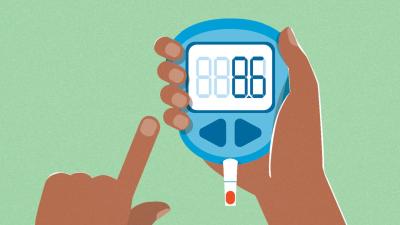
Type 2 Diabetes: Care Instructions
Type 2 diabetes is a disease that develops when the body's tissues cannot use insulin properly. Over time, the pancreas cannot make enough insulin. Insulin is a hormone that helps the body's cells use sugar (glucose) for energy. It also helps the body store extra sugar in muscle, fat, and liver cells.
Without insulin, the sugar cannot get into the cells to do its work. It stays in the blood instead. This can cause high blood sugar levels. A person has diabetes when the blood sugar stays too high too much of the time. Over time, diabetes can lead to diseases of the heart, blood vessels, nerves, kidneys, and eyes.
You may be able to control your blood sugar by losing weight, eating a healthy diet, and getting daily exercise. You may also have to take insulin or other diabetes medicine.
Follow-up care is a key part of your treatment and safety: Be sure to make and go to all appointments. Call your doctor if you are having problems. It's also a good idea to know your test results and keep a list of the medicines you take
Caring For Yourself At Home:
-
Monitor Blood Sugar: Regularly check your blood sugar levels as advised by your healthcare provider. Keep a record and share the readings during your appointments.
-
Healthy Eating: Opt for a balanced diet with complex carbohydrates, lean proteins, healthy fats, and plenty of fiber. Control portion sizes and limit sugary foods and drinks.
-
Regular Exercise: Engage in regular physical activity, such as brisk walking, cycling, or swimming, for at least 150 minutes per week. Consult your doctor before starting a new exercise routine.
-
Maintain Weight: Aim for a healthy weight range through a combination of a balanced diet and regular exercise, as weight management can help improve blood sugar control.
-
Medication: Take prescribed medications as directed by your healthcare provider. This may include oral medications or insulin injections. Never make changes to your medication without consulting your doctor.
-
Foot Care: Inspect your feet daily for cuts, sores, or changes. Keep your feet clean and moisturized and wear comfortable shoes to prevent complications.
-
Regular Check-ups: Schedule regular appointments with your doctor to monitor your blood sugar, blood pressure, and overall health. Get your eyes, kidneys, and cholesterol levels checked as recommended.
-
Stress Management: Practice relaxation techniques like deep breathing, meditation, or yoga to manage stress, as it can affect blood sugar levels.
-
Limit Alcohol: If you choose to drink, do so in moderation and with food. Alcohol can cause fluctuations in blood sugar levels.
-
Quit Smoking: Smoking can worsen diabetes complications. Seek support to quit smoking if needed.
-
Educate Yourself: Learn about diabetes and how to manage it. Understand the signs of high and low blood sugar and know how to respond.
-
Stay Hydrated: Drink plenty of water throughout the day to stay hydrated.
Remember, managing type II diabetes requires consistent effort and a partnership with your healthcare provider. Always consult your doctor before making significant changes to your lifestyle or medication.
When should you call for help?
Call 911 anytime you think you may need emergency care. For example, call if:
■ You passed out (lost consciousness), or you suddenly become very sleepy or confused. (You may have very low blood sugar.)
■ Your blood sugar is 300 mg/dL or is higher than the level your doctor has set for you.
■ You have symptoms of low blood sugar, such as:
• Sweating
• Feeling nervous, shaky, and weak
• Extreme hunger and slight nausea
• Dizziness and headache
• Blurred vision
• Confusion
►Watch closely for changes in your health, and be sure to contact your doctor if:
■ You often have problems controlling your blood sugar.
■ You have symptoms of long-term diabetes problems, such as:
• New vision changes
• New pain, numbness, or tingling in your hands or feet
• Skin problems
Remember, this guide is not a substitute for professional medical advice. Always consult a healthcare professional for accurate diagnosis and treatment or any other medical concern.
In an emergency, please call 911 immediately!
